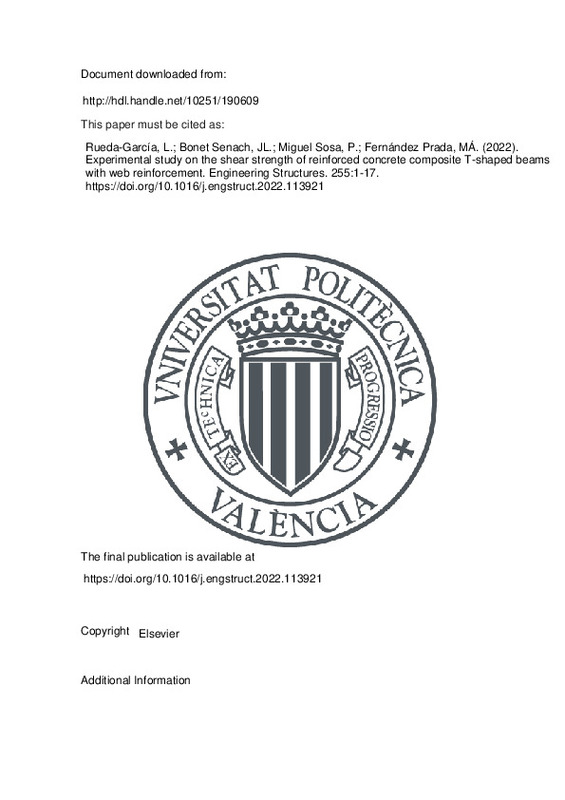JavaScript is disabled for your browser. Some features of this site may not work without it.
Buscar en RiuNet
Listar
Mi cuenta
Estadísticas
Ayuda RiuNet
Admin. UPV
Experimental study on the shear strength of reinforced concrete composite T-shaped beams with web reinforcement
Mostrar el registro sencillo del ítem
Ficheros en el ítem
| dc.contributor.author | Rueda-García, Lisbel
|
es_ES |
| dc.contributor.author | Bonet Senach, José Luís
|
es_ES |
| dc.contributor.author | Miguel Sosa, Pedro
|
es_ES |
| dc.contributor.author | Fernández Prada, Miguel Ángel
|
es_ES |
| dc.date.accessioned | 2022-12-12T19:01:41Z | |
| dc.date.available | 2022-12-12T19:01:41Z | |
| dc.date.issued | 2022-03-15 | es_ES |
| dc.identifier.issn | 0141-0296 | es_ES |
| dc.identifier.uri | http://hdl.handle.net/10251/190609 | |
| dc.description.abstract | [EN] The current increasing use of precast concrete elements and cast-in-place concrete slabs, namely concrete composite elements, in construction requires a better understanding of their behaviour in shear. In this work, 19 T-shaped composite and monolithic specimens failing in shear were experimentally tested. Their results were compared to study the influence on the shear strength of: the flange width, the presence of an interface between concretes and the strength of the concretes of both beam and slab. The shear transfer mechanisms were analysed by adapting to these specimens a mechanical model previously proposed by the authors for rectangular composite beams. It was concluded that: the composite specimens¿ shear strength did not increase with widening flange width when the specimens showed an extended interface cracking, but increased when their crack pattern was similar to that of the monolithic specimens; the presence of an interface decreased the shear strength; the slab¿s concrete compressive strength modified the composite specimens¿ shear strength when the slab failed in shear, but not when the slab failed in bending or when the interface failed. The shear formulations of EC2, MC-10 Level III and ACI 318-19 gave good estimations when using the weighted average of the compressive strengths of the beam and slab concretes, similarly to those obtained with the proposed model. From the experimental results, the improvement of the interface shear strength of composite beams is proposed as a practical recommendation for increasing their shear strength. At the same time, the slab width and the slab¿s concrete strength could be increased with the same purpose. This work experimental findings and the adaptation of the mechanical model to T-shaped beams lay the groundwork for a future development of a shear design and assessment formulation for concrete composite elements. | es_ES |
| dc.description.sponsorship | The authors would like to thank the Ministerio de Ciencia e Innovación (MCIN) and the Agencia Estatal de Investigación (AEI) for their support through grants BIA2015-64672-C4-4-R and RTI2018-099091-B-C21-AR, both funded by MCIN/AEI/ 10.13039/ 501100011033 and by ¿ERDF A way of making Europe¿. Author Lisbel Rueda-García was supported through grant BES-2016-078010 funded by MCIN/AEI/ 10.13039/501100011033 and by ¿ESF Investing in your future¿. The Regional Government of Valencia also supported this research through Project AICO/2018/250. This research work was undertaken at the Concrete Science and Technology University Institute (ICITECH) of the Universitat Politècnica de València (UPV; Spain) with concrete supplied by Caplansa. | es_ES |
| dc.language | Inglés | es_ES |
| dc.publisher | Elsevier | es_ES |
| dc.relation.ispartof | Engineering Structures | es_ES |
| dc.rights | Reconocimiento - No comercial - Sin obra derivada (by-nc-nd) | es_ES |
| dc.subject | Precast construction | es_ES |
| dc.subject | Reinforced concrete | es_ES |
| dc.subject | Composite beam | es_ES |
| dc.subject | T-shaped beam | es_ES |
| dc.subject | Shear strength | es_ES |
| dc.subject | Shear failure | es_ES |
| dc.subject | Mechanical behaviour | es_ES |
| dc.subject | Design | es_ES |
| dc.subject | Assessment | es_ES |
| dc.subject.classification | INGENIERIA DE LA CONSTRUCCION | es_ES |
| dc.title | Experimental study on the shear strength of reinforced concrete composite T-shaped beams with web reinforcement | es_ES |
| dc.type | Artículo | es_ES |
| dc.identifier.doi | 10.1016/j.engstruct.2022.113921 | es_ES |
| dc.relation.projectID | info:eu-repo/grantAgreement/AEI/Plan Estatal de Investigación Científica y Técnica y de Innovación 2017-2020/RTI2018-099091-B-C21/ES/MEJORA DE LA SOSTENIBILIDAD, SEGURIDAD Y RESILIENCIA DE LA CONEXION ENTRE VIGAS SEGMENTADAS PREFABRICADAS DE HORMIGON MEDIANTE EL USO DE NUEVOS MATERIALES/ | es_ES |
| dc.relation.projectID | info:eu-repo/grantAgreement/AEI//BES-2016-078010//AYUDAS PARA CONTRATOS PREDOCTORALES PARA LA FORMACION DE DOCTORES-RUEDA GARCIA/ | es_ES |
| dc.relation.projectID | info:eu-repo/grantAgreement/MINECO//BIA2015-64672-C4-4-R/ES/EVALUACION EXPERIMENTAL DE VIGAS CONTINUAS PRETENSADAS, CON Y SIN REFUERZO, Y PIEZAS COMPUESTAS DE DOS HORMIGONES, PARA LA EXTENSION DE SU VIDA UTIL/ | es_ES |
| dc.relation.projectID | info:eu-repo/grantAgreement/GENERALITAT VALENCIANA//AICO%2F2018%2F250//EVALUACION DE LA SEGURIDAD ESTRUCTURAL FRENTE A ESFUERZOS TANGENCIALES DE VIGAS COMPUESTAS DE HORMIGON./ | es_ES |
| dc.rights.accessRights | Abierto | es_ES |
| dc.contributor.affiliation | Universitat Politècnica de València. Escuela Técnica Superior de Ingenieros de Caminos, Canales y Puertos - Escola Tècnica Superior d'Enginyers de Camins, Canals i Ports | es_ES |
| dc.description.bibliographicCitation | Rueda-García, L.; Bonet Senach, JL.; Miguel Sosa, P.; Fernández Prada, MÁ. (2022). Experimental study on the shear strength of reinforced concrete composite T-shaped beams with web reinforcement. Engineering Structures. 255:1-17. https://doi.org/10.1016/j.engstruct.2022.113921 | es_ES |
| dc.description.accrualMethod | S | es_ES |
| dc.relation.publisherversion | https://doi.org/10.1016/j.engstruct.2022.113921 | es_ES |
| dc.description.upvformatpinicio | 1 | es_ES |
| dc.description.upvformatpfin | 17 | es_ES |
| dc.type.version | info:eu-repo/semantics/publishedVersion | es_ES |
| dc.description.volume | 255 | es_ES |
| dc.relation.pasarela | S\455682 | es_ES |
| dc.contributor.funder | GENERALITAT VALENCIANA | es_ES |
| dc.contributor.funder | AGENCIA ESTATAL DE INVESTIGACION | es_ES |
| dc.contributor.funder | MINISTERIO DE ECONOMIA Y EMPRESA | es_ES |







![[Cerrado]](/themes/UPV/images/candado.png)

